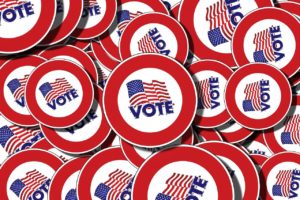President Joe Biden (D) is tied in Virginia with former President Donald Trump (R) in a possible 2024 presidential election rematch, according to a new statewide survey from the Center for Leadership and Media Studies at the University of Mary Washington.

Each candidate received 37 percent in the 1,000-person poll of Virginia adults, which was conducted by Research America Inc. Sept. 5-11. Other respondents said they were undecided.
Biden defeated Trump by a ten-point margin in Virginia in 2020, the latest in a string of four consecutive Democratic Electoral College wins in the commonwealth. George W. Bush was the last Republican presidential candidate to win in Virginia, and he did so in both 2000 and 2004.
If Republicans select Florida Gov. Ron DeSantis as their presidential nominee, he would start out as less competitive than Trump would be against Biden in Virginia. DeSantis had the support of 30 percent of those Virginians surveyed as compared to 39 percent for Biden.
Although he is not a presidential candidate, Virginia Gov. Glenn Youngkin fared better than DeSantis against Biden in a hypothetical match-up. Youngkin received 34 percent support in the survey, as compared to 37 percent for Biden – results within the survey’s margin of error.
“Virginia looks a lot like America as a whole in this survey,” said Stephen J. Farnsworth, professor of political science at the University of Mary Washington and director of UMW’s Center for Leadership and Media Studies. “President Biden is relatively unpopular now in Virginia and nationally, and national surveys also suggest 2024 is shaping up to be an extremely competitive election cycle.”
Virginians favored Donald Trump becoming the Republican nominee, with 23 percent supporting the former president in the survey. No other candidate secured double-digit support. Former South Carolina Gov. Nikki Haley had the support of 7 percent, as compared to 6 percent for former New Jersey Gov. Chris Christie, 6 percent for Youngkin and 5 percent for DeSantis.
“Virginia’s governor is doing relatively well as a potential candidate in this survey of Virginians,” Farnsworth said. “Although all the candidates remain far behind Trump, Youngkin, who is being touted by some conservatives, is doing better here than some of the candidates who are actually running for office.”
Asked about their second choice, 16 percent of respondents named DeSantis and 10 percent said Haley. Trump was a bit further back in the pack as a second-choice preference, with 8 percent identifying the former president as their alternative preference.
Taken together Trump was the first or second place choice of 31 percent of those surveyed, while DeSantis was the first or second choice of 21 percent and Haley was the first or second choice of 17 percent.
“Because Virginia does not register voters by part, any registered voter can choose to participate in a party primary,” Farnsworth said. “In addition, second place preferences are particularly important when considering the Virginia electorate, as the presidential field narrows a good deal after the early nomination states of Iowa and New Hampshire.”
When respondents who do not plan to vote in the Republican primary are excluded, 36 percent of the remaining respondents said Trump was their first choice, 11 percent said Haley and 10 percent each said Christie or Youngkin.
“Despite all the legal challenges Trump faces, Republicans in Virginia – like their counterparts outside the Commonwealth – want the former president to be the party’s standard bearer next year,” Farnsworth said.
Asked whether the former president should run as a third-party candidate if he loses the Republican nomination contest, 56 percent said he should not run and 27 percent thought he should. The rest were uncertain.
Survey Information:
The University of Mary Washington’s Fall 2023 Virginia Survey was conducted by Research America Inc. during September 5 – 11, 2023. The total sample included 1,000 Virginia residents, including 833 registered voters and 771 likely voters. Part of the sample (600) was contacted by phone (80 percent cell and 20 percent landline), and part of the sample (400) was contacted online. All interviews were in English. Statistical results are weighted to correct known demographic discrepancies, including age, gender and race/ethnicity. The margin of error on the total sample is +/- 3.0%. The margin of error on the Likely Voters portion of the sample is +/- 3.5%.
For more survey results, see Topline.
Also see related survey results in previous stories, Statewide Survey Shows Largely Positive Marks for Virginia’s Public Schools and Virginians Closely Divided Over 2023 Legislative Elections in Statewide Survey.
For further information or to request an interview, contact Professor Farnsworth at sfarnswo@umw.edu.